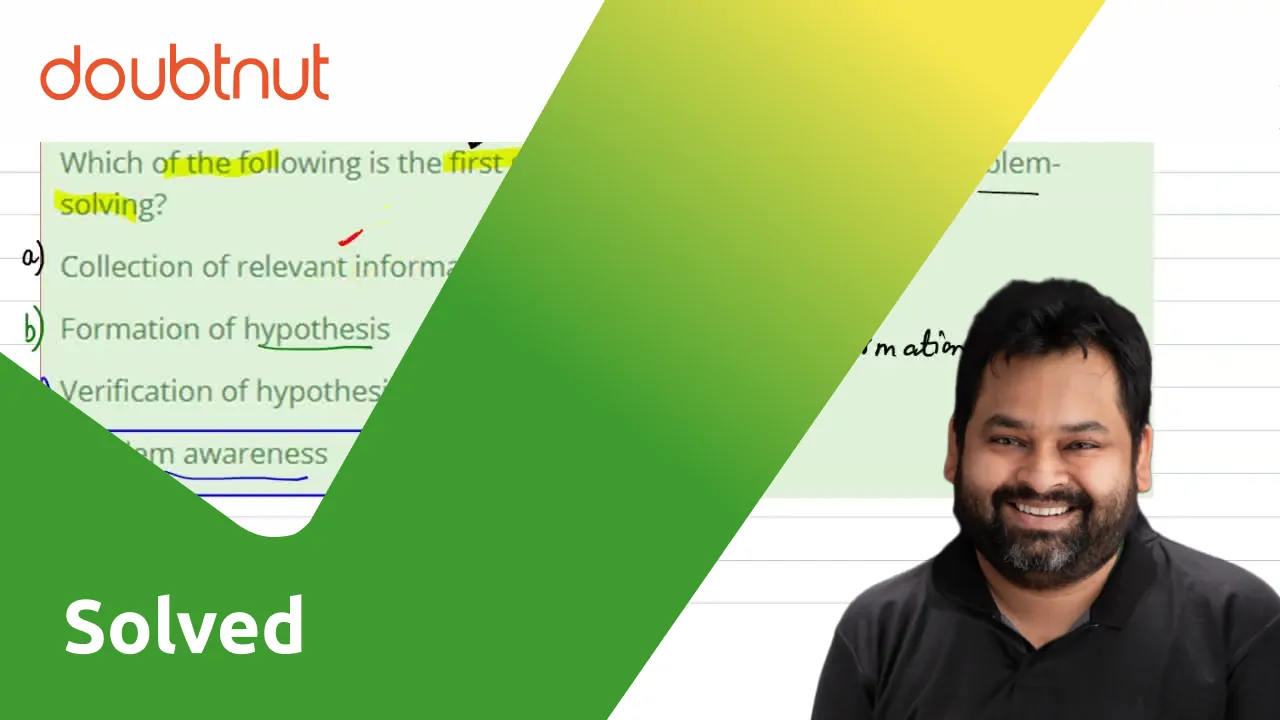Which of the following is the first step in the scientific method of problem-solving?
A
Verification of hypothesis
B
Problem awareness
C
Collection of relevant information
D
Formation of hypothesis
Video Solution
Text Solution
The correct Answer is:B
Scientific methods are defined as controlled, systematic investigations that are rooted in objective reality and that aim to develop general knowledge about natural phenomena. Problem-solving is a mental process and is part of the larger problem process that includes problem finding and problem shaping. Considered the most complex of all intellectual functions, problem-solving has been defined as a higher-order cognitive process that requires the modulation and control of more routine or fundamental skills. Problem-solving occurs when an organism or an artificial intelligence system needs to move from a given state to the desired goal state. The first step to solve the problem is to understand its different aspects and nature i.e. to figure out just what issues, obstacles, and goals are involved. The steps of the scientific method are stating the problem, forming a hypothesis, testing the hypothesis/conducting experiment, and drawing a conclusion based on test results and reports. Stating the problem/ problem of Awareness - The first step in the scientific method is to identify and analyze a problem. Data regarding the problem can be collected using a variety of methods. Forming a hypothesis-A hypothesis is a statement that provides an educated prediction or proposed solution. Testing the hypothesis/conducting experiment-This is when an activity is created to confirm (or not confirm) the hypothesis. Verification of Hypothesis-Once the experiment is complete, the results can be analyzed. The results should either confirm the hypothesis as true or false. Drawing a conclusion based on test results- It is the last step of problem-solving during this stage when relevant information is collected.
Was this answer helpful?472
Updated on:21/07/2023
Similar Questions
तीन छात्रों द्वारा किसी प्रश्न के हल करने की प्रायिकताएँ क्रमश: 13,14,15 है, तो प्रश्न हल किए जाने की प्रायिकता निकालें |
02:40View SolutionHNO3 के उत्पादन की ऑस्टवाल्ड विधि में उत्प्रेरक उपयोग में लाया जाता है ?
Text SolutionView Solutionनिम्नलिखित में से किस प्रकार का फास्फोरस फोसी जबड़ों (Phossy Jaws) में पाया जाता है-
Text SolutionView Solutionनिम्नलिखत में से कौन-सा तत्व धातु है-
02:06View Solutionनिम्नलिख्ति में कौन-सा ऑक्साइड उभयधर्मी प्रकृति का होता है-
Text SolutionView Solutionनिम्नलिखित में से किसकी विद्युतऋणात्मकता सर्वोचत्म है-
01:42View Solutionनिम्नलिखित में से कौन-सा उपयुक्त नहीं है-
Text SolutionView Solutionनिम्नलिखित में से कौन-सा अम्ल में क्लोरीन की ऑक्सीकरण अवस्था +5 है-
01:45View Solution
